UPDATED
Everything is political™: Ancient sculptures edition
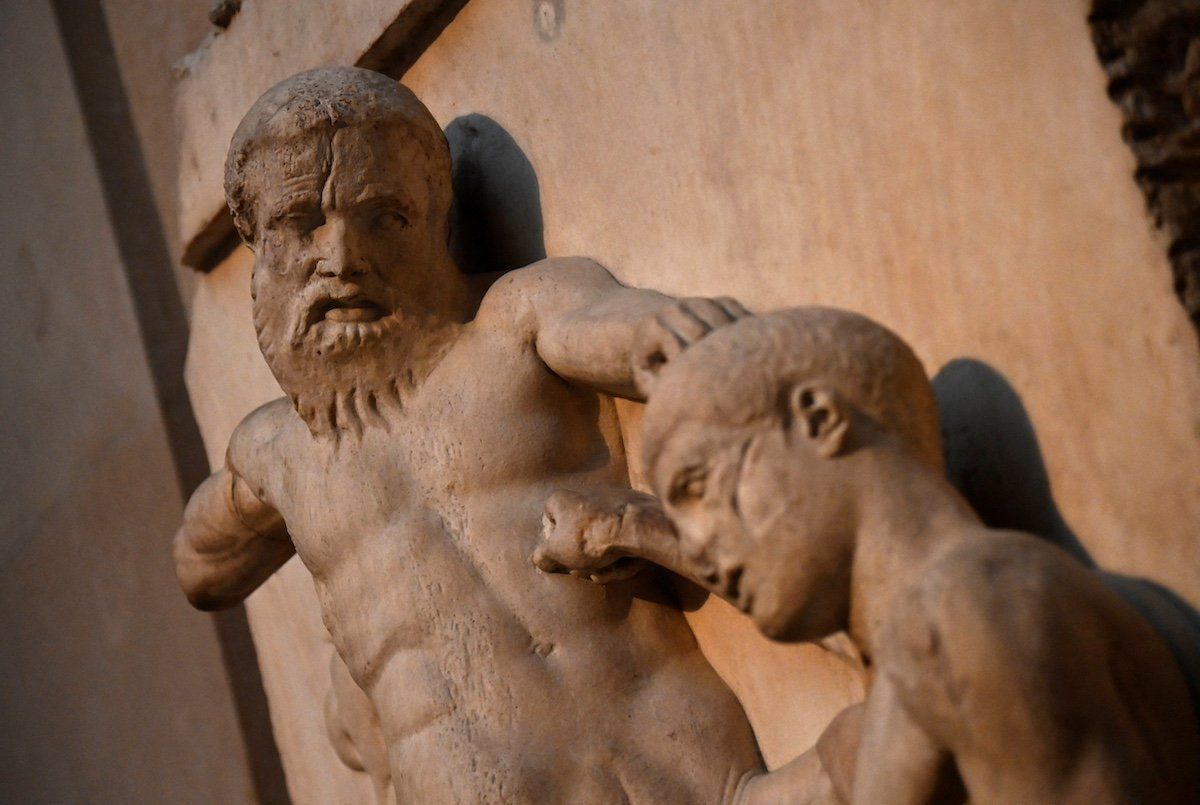
Detail of a metope that forms part of the Parthenon sculptures, sometimes referred to in the UK as the Elgin Marbles, is displayed at the British Museum in London, Britain, January 25, 2023.
Sometimes life imitates art. Sometimes art imitates life. And sometimes — sometimes — art actually screws up a summit between two European heads of state. This week, UK Prime Minister Rishi Sunak abruptly canceled a meeting with his Greek counterpart Kyriakos Mitsotakis after the Greek leader demanded the return of the so-called “Elgin marbles” in a BBC interview. London says the Greeks had promised not to raise the issue. Athens denies this.
What are the Elgin marbles? A set of sculptures from the Parthenon, the famous ancient Greek temple in Athens. They have been on display at the British Museum since the 19th century, after a visiting British nobleman – Lord Elgin – plucked them off the badly neglected and half-wrecked Parthenon, which at the time was under Ottoman rule.
The government of modern Greece has long demanded their return to Athens. But the British have refused. Elgin, they say, had Ottoman permission to remove the artworks, which would otherwise have suffered further neglect and destruction. The British Museum, for its part, says it’s willing to share certain pieces but not return them officially. Although Greece was never under British rule, the Elgin marbles debate has echoed broader questions about whether European museums should return items taken or stolen from Africa and elsewhere during the colonial period. The British in general have been especially opposed to doing so.
Is Sunak OK? Still, canceling a meeting that was meant to focus on “Gaza, Ukraine, climate, and migration” seems distinctly unartful. It’s true that Sunak’s Conservative Party has long been especially adamant that the sculptures should stay in England. And yes, the PM is struggling with a sluggish economy and a big split within his party over immigration. But the Parthenon sculptures are hardly red meat for his base, and in any event, Athens has reportedly been nearing a compromise with the British Museum.
The best expanation we’ve seen: a text message that someone on the EU commission evidently sent to our Eurasia Group pal Mujtaba Rahman: “Has Sunak lost his marbles?”Visitors look at ancient sculptures that are part of the Parthenon Marbles at the British Museum in London, Tuesday, Nov. 28, 2023. Greek officials said Tuesday Nov. 28, 2023 that they will continue talks with the British Museum on bringing the Parthenon Marbles back to Athens, despite U.K. Prime Minister Rishi Sunak cancelling a meeting with his Greek counterpart where the contested antiquities were due to be discussed.(AP Photo/Kirsty Wigglesworth)Read More
A visitor takes pictures of sculptures that are part of the Parthenon Marbles at the British Museum in London, Tuesday, Nov. 28, 2023. Greek officials said Tuesday Nov. 28, 2023 that they will continue talks with the British Museum on bringing the Parthenon Marbles back to Athens, despite U.K. Prime Minister Rishi Sunak cancelling a meeting with his Greek counterpart where the contested antiquities were due to be discussed.(AP Photo/Kirsty Wigglesworth)
A visitor walks past ancient sculptures that are part of the Parthenon Marbles at the British Museum in London, Tuesday, Nov. 28, 2023. Greek officials said Tuesday Nov. 28, 2023 that they will continue talks with the British Museum on bringing the Parthenon Marbles back to Athens, despite U.K. Prime Minister Rishi Sunak cancelling a meeting with his Greek counterpart where the contested antiquities were due to be discussed.(AP Photo/Kirsty Wigglesworth)
Visitors look at ancient sculptures that are part of the Parthenon Marbles at the British Museum in London, Tuesday, Nov. 28, 2023. Greek officials said Tuesday Nov. 28, 2023 that they will continue talks with the British Museum on bringing the Parthenon Marbles back to Athens, despite U.K. Prime Minister Rishi Sunak cancelling a meeting with his Greek counterpart where the contested antiquities were due to be discussed.(AP Photo/Kirsty Wigglesworth)
BY JILL LAWLESS AND DEREK GATOPOULOS
November 28, 2023
LONDON (AP) — Greek officials said Tuesday that they will continue talks with the British Museum about bringing the Parthenon Marbles back to Athens, despite U.K. Prime Minister Rishi Sunak abruptly canceling a meeting with his Greek counterpart where the contested antiquities were due to be discussed.
But the U.K. government said ownership of the marbles is “settled” — and they’re British.
The two European allies traded barbs Tuesday in a deepening diplomatic row that erupted when Sunak called off a meeting with Greek Prime Minister Kyriakos Mitsotakis hours before it was due to take place.
Mitsotakis had planned to raise Greece’s decades-old demand for the return of the ancient sculptures when he met Sunak at 10 Downing St. on Tuesday. The two center-right leaders were also slated to talk about migration, climate change and the wars in Gaza and Ukraine.
How a group of ancient sculptures sparked a dispute between Greece and the UK
Diplomatic spat over the Parthenon Marbles scuttles meeting of British and Greek leaders
Mitsotakis was instead offered a meeting with Deputy Prime Minister Oliver Dowden, which he declined.
British officials were annoyed that Mitsotakis had appeared on British television Sunday and compared the removal of the sculptures from Athens to cutting the Mona Lisa in half.
Sunak’s spokesman, Max Blain, said Mitsotakis had reneged on a promise not to talk publicly about the marbles during his three-day visit to Britain.
“The Greek government provided reassurances that they would not use the visit as a public platform to relitigate long-settled matters relating to the ownership of the Parthenon Sculptures,” he said. “Given those assurances were not adhered to, the prime minister felt it would not be productive” to have the meeting.
The Greek government denied Mitsotakis had agreed not to raise the subject in public.
Mitsotakis met Monday in London with U.K. opposition Labour Party leader Keir Starmer, whose party leads Sunak’s governing Conservatives in opinion polls. The prime minister’s office denied that meting had contributed to Sunak’s decision to cancel.
Dimitris Tsiodras, head of the Greek prime minister’s press office, said Mitsotakis was angry at the “British misstep.”
“Of course he was angry ... Look, Greece is a proud country. It has a long history. Mitsotakis represents that country,” Tsiodras told private network Mega television.
Opposition parties in Greece, from the Greek Communist Party and centrists to far-right nationalists, also condemned Sunak for the cancellation. Left-wing opposition leader Stefanos Kasselakis said the issue of the sculptures goes “beyond party differences.”
“It is a national issue that concerns the history of an entire people. And it is a moral issue concerning the shameless theft of cultural wealth from its natural setting,” he wrote on X, formerly known as Twitter.
Athens has long demanded the return of sculptures that were removed from Greece by British diplomat Lord Elgin in the early 19th century. Part of friezes that adorned the 2,500-year-old Parthenon temple on the Acropolis, the Elgin Marbles – as they are known in Britain -- have been displayed at the British Museum in London for more than two centuries. The remainder of the friezes are in a purpose-built museum in Athens.
The British Museum is banned by law from giving the sculptures back to Greece, but its leaders have held talks with Greek officials about a compromise, such as a long-term loan.
Earlier this year, museum chairman George Osborne — Treasury chief in a previous Conservative U.K. government — said the discussions had been “constructive.”
Tsiodras said Tuesday that discussions “are ongoing with the British Museum for the return – I should say the reunification – of the marbles to Athens.”
“I don’t think the effort stops there,” he said. “Clearly, there are domestic reasons and 2024 is an election year and (Sunak) is quite behind in the polls ... but the discussion with the British Museum is ongoing.”
Sunak’s government appears to have hardened its position, however.
Transport Secretary Mark Harper said that “the government set out its position about the Elgin Marbles very clearly, which is they should stay as part of the permanent collection of the British Museum.”
And Blain said that “a loan cannot happen without the Greeks accepting that the British Museum are the legal owners” of the antiquities.
___
Gatopoulos reported from Athens, Greece.
JILL LAWLESS is an Associated Press reporter covering U.K. politics and more. She is based in London.
‘Elgin marbles important part of Greek heritage’ - expert
28 November 2023

Professor Amy Smith, Professor of Classical Archaeology at the University of Reading, comments on the cultural and historical significance of the Elgin Marbles, following a row between the British and Greek governments over the collection of ancient Greek treasures.
Professor Amy Smith said: “By the late 18th century, the sanctuaries of Athena and other deities on Classical Athens’ Akropolis had become a ruin: a Venetian shell had hit Pheidias’ extraordinary Temple of Athena, a.k.a. the Parthenon, in September 1687, while it was being used by the Ottomans as a gunpowder store.
“For centuries before, in fact, visitors had been taking the Akropolis’ ancient marbles home with them. When 'Lord Elgin' (aka Thomas Bruce, 7th Earl of Elgin) acquired and eventually sold to the British government Parthenon and related sculptures now displayed in the British Museum (and other foreign museums, e.g. the Louvre), with the idea that they might encourage British arts and crafts, the Ottoman authorities granted him ‘permission.’
“Now that Athens is governed by Greeks, it is natural that they want the ‘Elgin marbles’, which are an important part of their heritage, returned to them. The situation is obviously complicated and requires careful negotiations and creative solutions, like an exchange of artisans or artisanal skill to fulfil Elgin’s original aim to improve the arts of Britain.”
What visitors to the British Museum
think should happen to the Elgin Marbles
A diplomatic row erupted after Rishi Sunak cancelled a meeting with the Greek prime minister where the statues were due to be discussed
1 day ago
The Elgin Marbles have been a source of diplomatic and cultural controversy since a row erupted over where the ancient artifacts should be homed.
Athens has long demanded the return of the historic works, also known as the Parthenon Sculptures, which were removed from Greece by Lord Elgin in the early 19th century when he was the British ambassador to the Ottoman Empire.
A diplomatic row erupted on Tuesday after Rishi Sunak was accused of cancelling a meeting with the Greek prime minister at the 11th hour.
The diplomatic spat comes after Mr Mitsotakis had used an interview ahead of the anticipated talks to push for the return of the Elgin Marbles, saying the current situation was like the Mona Lisa painting being cut in half.
Visitors at the British Museum today demonstrated the clash of opinions - with some saying it’s like “cutting tower bridge in half” but others asking where the returning of artifacts would stop if they were to be returned.
Greek tourists visiting London told The Independent in front of the statues that they should be returned.
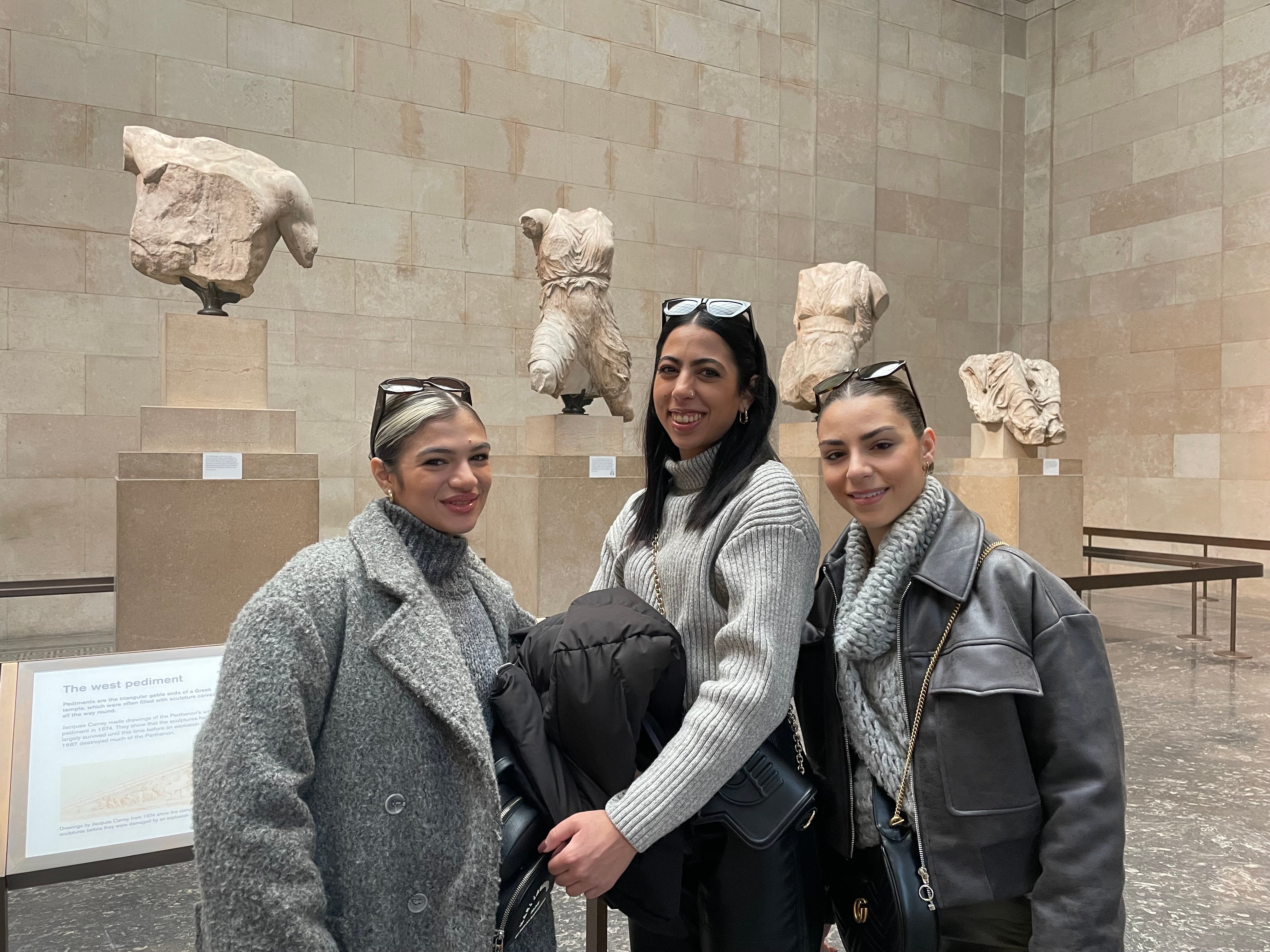
Greek-Cypriots Zoe, Rafaella and Stella say the statues
(The Independent)
“It means a lot to Greek people. They should definitely go back to where they came from because to Greek people, it means a lot. It’s our history.” Zoe, 25, from Limassol, Cyprus said.
Her friend Rafaella, also 25, added: “I definitely think they should go back. It’s a part of Greek culture and therefore should be in Greece. I know that others want them here but in my opinion, I think they should be returned.”
Commenting on the British prime minister’s late cancellation, Stella, also a Greek-Cypriot said: “It’s weird that Sunak cancelled the meeting, we didn’t know he did that. Maybe it was on purpose that it got cancelled? It was very last minute.”
On the other hand, Jullianne Jollie, 58, from the Wirral says she has changed her mind about where the statues should be homed.
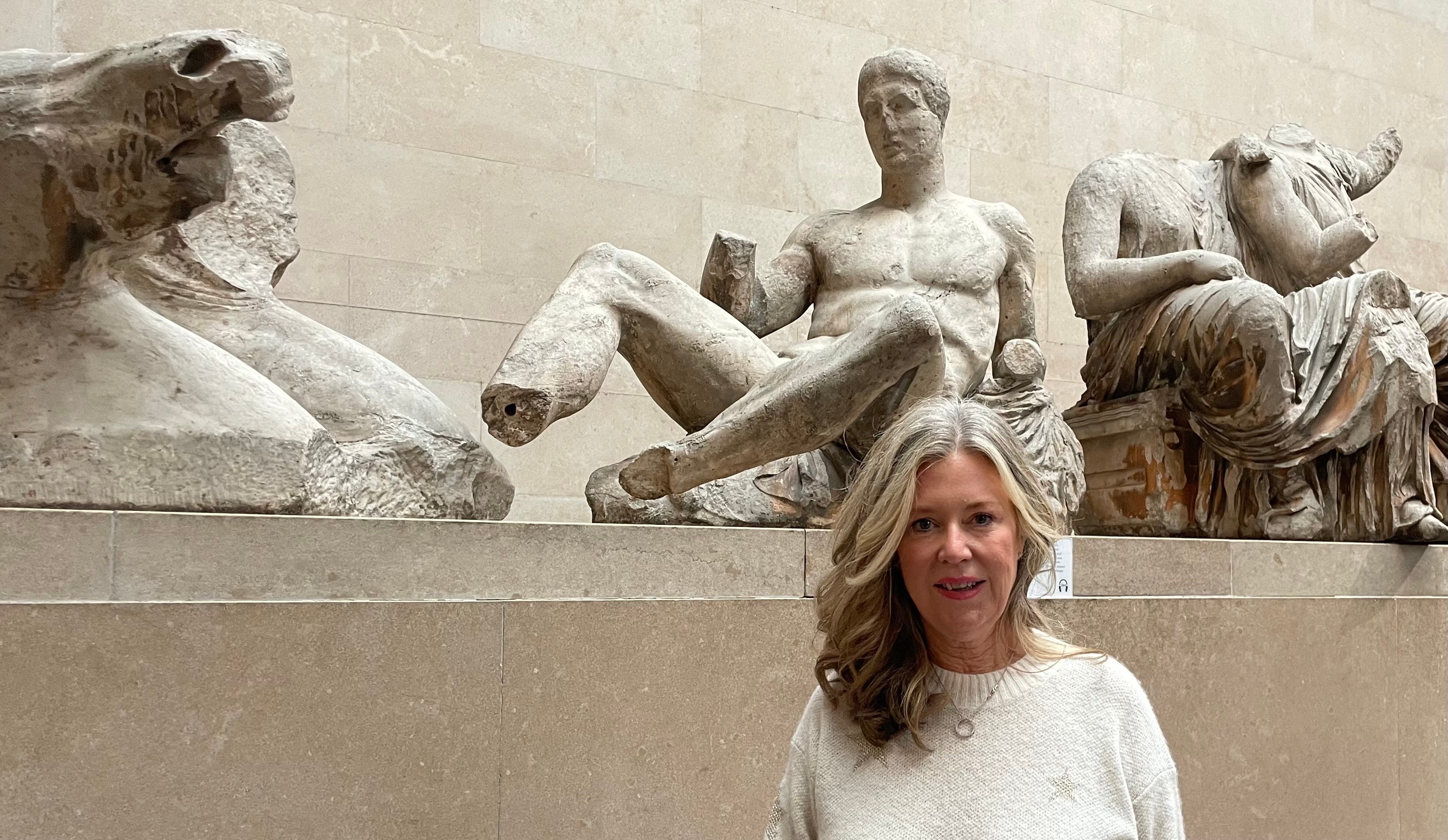
Julliane Jolie says she is concerned whether returning the marbles will set a precedent
(The Independent)
“I’ve gone from thinking they absolutely should go back to thinking as time goes on that they shouldn’t,” The retired education publisher told The Independent.
“If you asked me 18 months ago I would have said yes but then when does it stop?
“The whole point of a museum is preservation for the future. I don’t know what the Greeks think about it but to be honest I think it’s good to see some Greek culture in London. Not everyone can go all the way to Greece.”
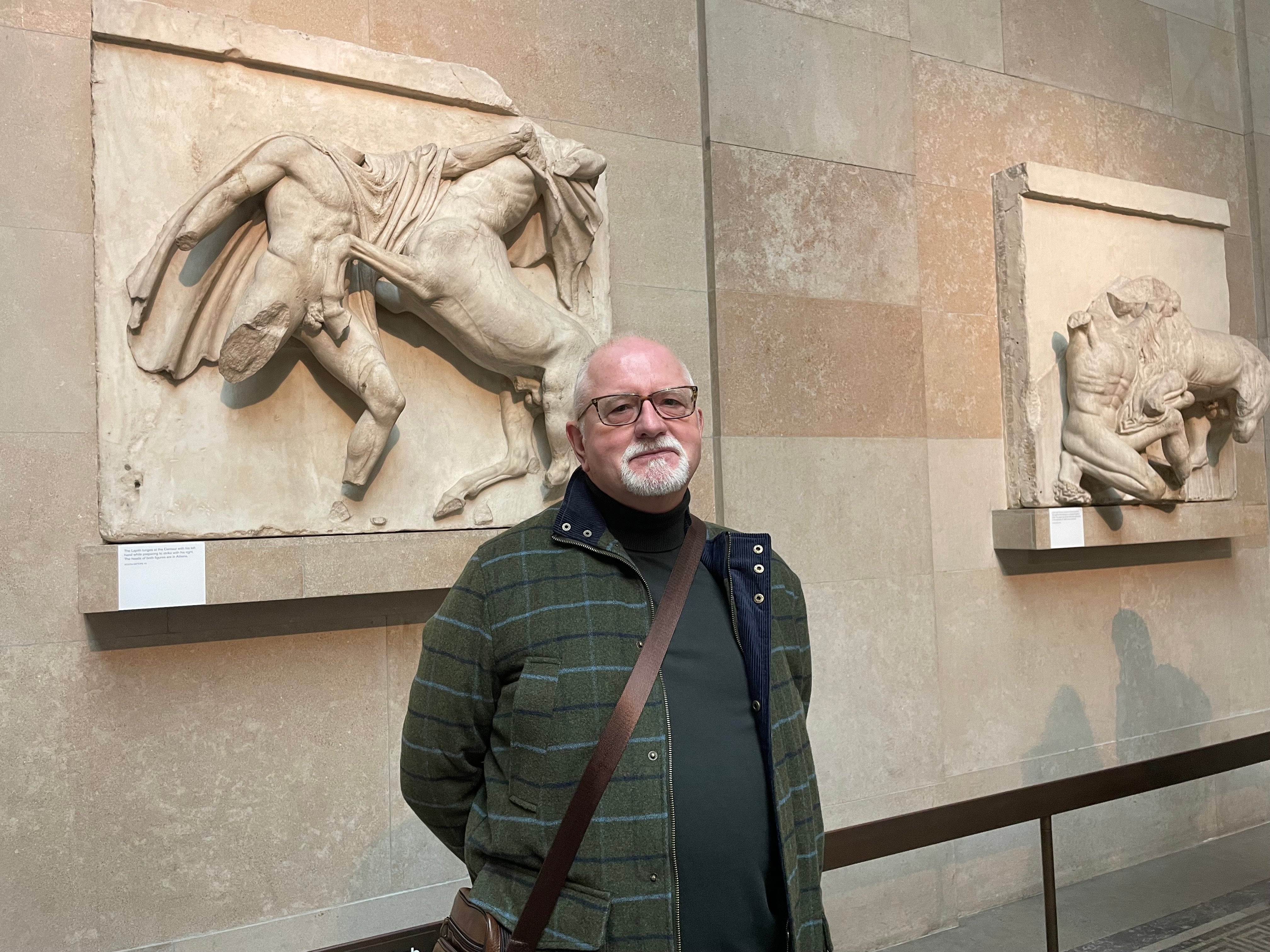
John Ransom said it ‘makes no sense’ that the heads of these statues remain in Athens
(The Independent)
John Ransom, 70, from Edgeware, London also has mixed opinions on the matter.
“Something says morally it should go back but then you’re setting a precedent for all of the countries to say they want their stuff back. If these things weren’t here we wouldn’t be standing in this museum,” he said.
“The British do have a habit of taking stuff or buying stuff but not for the right price. That seems to be a British tradition, unfortunately.
“It should be challenged and it’s right that it’s challenged. There are pieces over there that are missing their heads and that’s because the heads are in Athens. What sense does that make?
“How would we feel if they came over and started taking Tower Bridge? We wouldn’t like it if our heritage was stolen.”
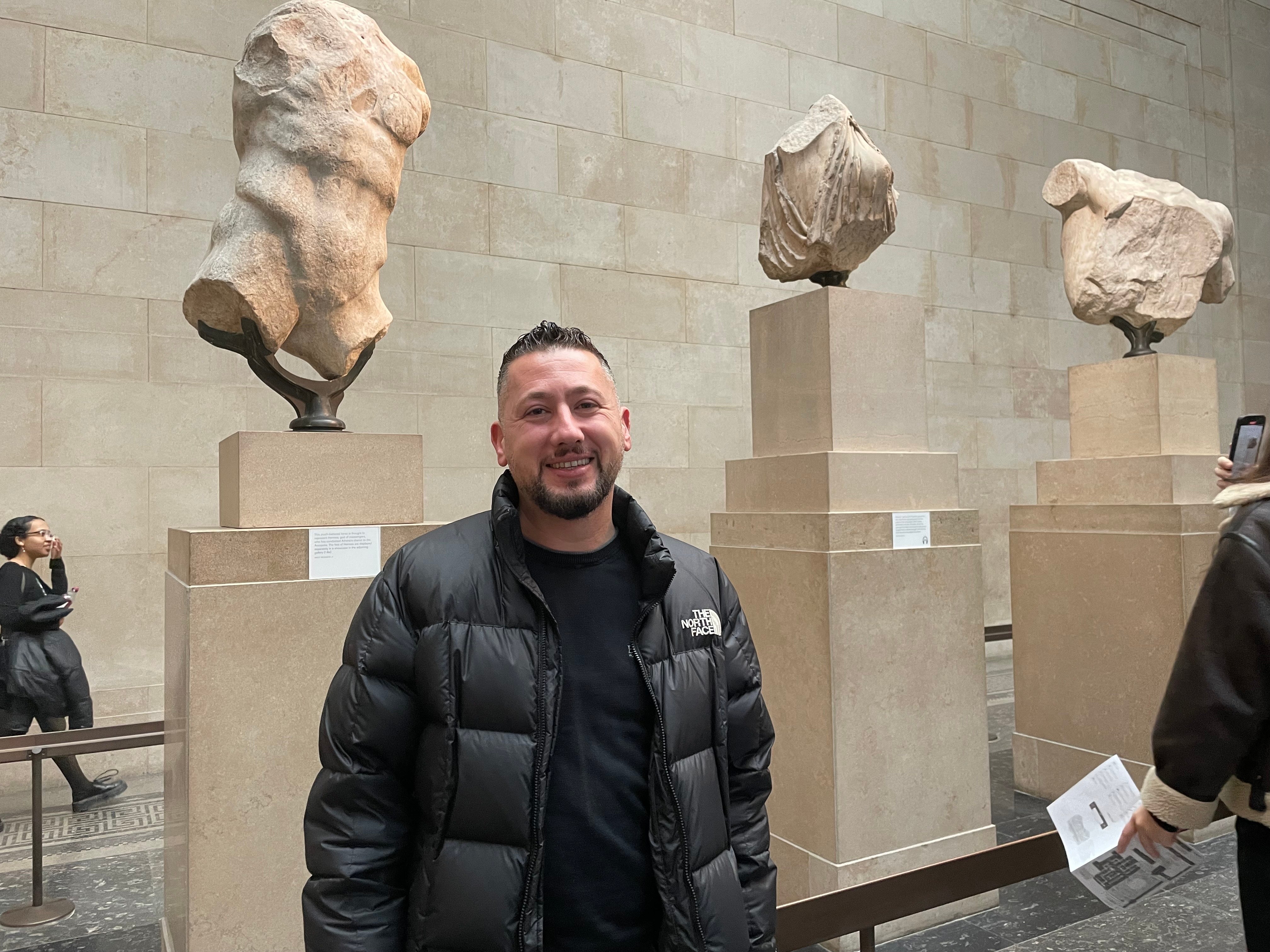
Ersin Kurnaz says he had to go from Athens to London to see the other half of the Parthenon
(The Independent)
Another visitor to the museum, Ersin Kurnaz, 40, believes the statues must not feel at home in London.
He said: “I went to Athens not long ago and saw the Parthenon, it’s weird having to see half of it there and half of it here.
“I am Turkish but living in Germany. I think it’s similar in the sense that my origin will always be Turkey. When I’m in Turkey it’s a different feeling. It feels like home. I think it must be the same for the sculptures.”
Greek art historian Maria Paloma de Alvarado was also admiring the statues on Tuesday and said the debate was complex.
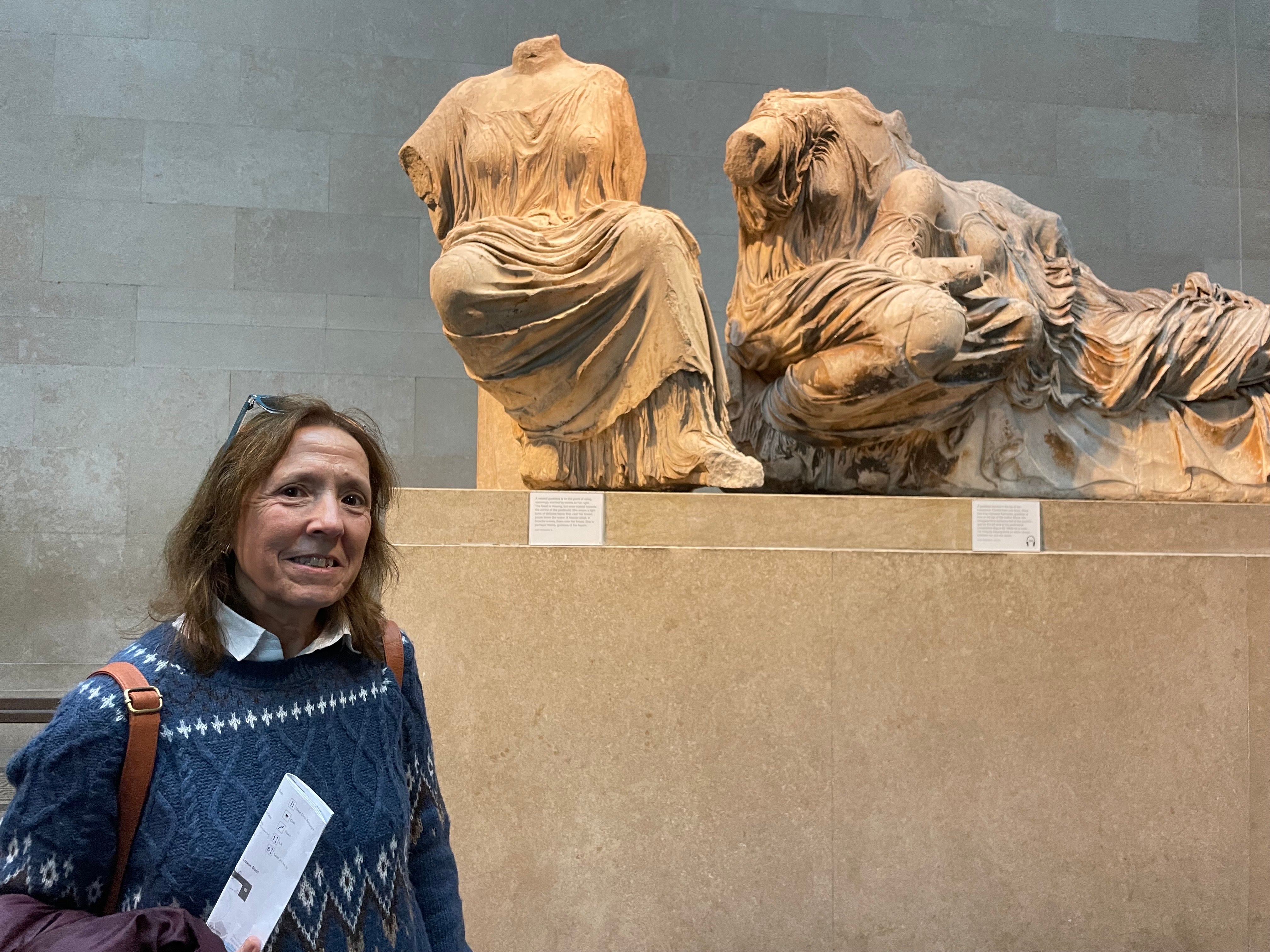
Greek art historian Maria Paloma de Alvarado said the fate of the statues may have been worse if they had not been bought by Lord Elgin
(The Independent)
“I believe yes, they should be returned. While they bought it legally it’s part of the Greek identity,” she said.
“There is a discussion here however because if Lord Elgin hadn’t had bought all of this it probably all would have disappeared.”
British Museum chairman George Osborne, a former chancellor, has previously said he is exploring ways for the Elgin Marbles to be displayed in Greece, with speculation that this could involve a loan deal in which part of the set would be sent to Athens.
But on Monday, the prime minister’s official spokesman stressed Mr Sunak’s support for the law that prevents the marbles from being permanently returned and suggested he would not be in favour of any loan arrangement.
The Greek prime minister Kyriakos Mitsotakis expressed disappointment in Mr Sunak’s last-minute cancellation of their meeting.
In a statement published on X, formerly Twitter, he wrote: “Anyone who believes in the correctness and justice of their positions is never afraid of opposing arguments.”
No 10 said Rishi Sunak felt it would ‘not be productive’ to hold a meeting that could be ‘dominated’ by discussion about the sculptures.

GREEK PRIME MINISTER KYRIAKOS MITSOTAKIS CUT SHORT HIS TRIP TO TH
PATRICK DALY
Allies of the Greek premier have pushed back against claims that he broke an agreement not to use a UK visit as a “public platform” to demand the Elgin Marbles’ return.
Rishi Sunak scrapped face-to-face talks planned for Tuesday with Greek leader Kyriakos Mitsotakis after feeling he had rowed back on “reassurances” that he would avoid an open debate about the ownership of the ancient artefacts.
Downing Street said the Prime Minister feared any bilateral meeting in London was likely to be “dominated” by the marbles row after Mr Mitsotakis gave an interview on Sunday pressing for them to be returned by the British Museum to Athens.
The PA news agency understands that the Greek side disagrees with No 10’s characterisation of the situation as the diplomatic storm refused to abate.
It is our view that, for far too long, constant attempts to relitigate in public the long settled issue of the ownership of the marbles has cast a shadow over an otherwise productive relationship with Greece
PRIME MINISTER RISHI SUNAK'S OFFICIAL SPOKESMAN
Athens’ view is that the idea that Mr Mitsotakis would come to London and not respond to a question about the marbles, which are also known as the Parthenon Sculptures, in a BBC interview was nonsense.
It is understood the Greek prime minister plans to continue to raise the issue every time he comes to the UK, but he has never had the opportunity to discuss it in person with Mr Sunak.
Asked about Athens’ position on the interview, the Prime Minister’s official spokesman said Sunday’s comments had put the marbles “front and centre of the debate”.
“Obviously it is up to the Greek government the media they choose to do but, when they have provided reassurances that they will not seek to publicise this, we don’t think those assurances were adhered to,” he added.
Greece has long demanded the return of the historic works, which were removed from the Acropolis of Athens by Lord Elgin in the early 19th century when he was the British ambassador to the Ottoman Empire.
No 10 said it had been keen to avoid a repeat of Mr Mitsotakis’s visit to the UK in 2021, when the Government felt he had used the trip as a “public platform” to press for the marbles’ return.
Mr Mitsotakis, ahead of that occasion two years ago when Boris Johnson was prime minister, had said the 17 figures “belong in the Acropolis Museum”.
Ahead of this week’s visit, Downing Street confirmed it “sought assurances” that similar public pronouncements would not be made.
But in an interview on Sunday, Mr Mitsotakis described the current situation as being akin to the Mona Lisa painting being cut in half.
The comments appear to have annoyed No 10, with the Prime Minister’s spokesman telling reporters that Mr Sunak decided it would “not be productive” to go ahead with talks that had been scheduled for Tuesday.
The spokesman said: “It is our view that, for far too long, constant attempts to relitigate in public the long settled issue of the ownership of the marbles has cast a shadow over an otherwise productive relationship with Greece and that those conversations are best had in private.
“Those were the assurances that were provided to us in advance of this meeting.
“Those assurances were not adhered to and you saw the subsequent action that was taken.”
No 10 said it offered talks with Deputy Prime Minister Oliver Dowden instead, but that goes against the usual protocol which would normally mean a visiting prime minister would meet Mr Sunak, rather than a more junior minister.
Greek minister Adonis Georgiadis said Mr Sunak had made a “bad choice” in scrapping the bilateral meeting.
He told BBC Radio 4’s World At One: “It was a mistake. It was a bad day for our relationship. I hope that we will find a way out soon.”
Mr Georgiadis said Mr Mitsotakis, in his interview arguing for the return of the marbles, had expressed the view of the Greek people.
“Elgin stole the marbles, that is it,” he added.
In a strongly-worded statement on Monday, a spokesman for the Greek prime minister’s office said Mr Mitsotakis was “disappointed” and “extremely surprised” that his British counterpart had cancelled their meeting “at the 11th hour”.
A Greek source said they were particularly confused by Mr Sunak’s decision given that preventing migrant sea crossings — one of Mr Sunak’s top five priorities — was high on the agenda.
Along with discussing the sculptures, the Greek government said it had been hoping to also broach efforts to tackle climate change and challenges such as the conflicts in Ukraine and the Middle East.
British Museum chairman George Osborne, a former chancellor, has previously said he is exploring ways for the Elgin Marbles to be displayed in Greece, with speculation that this could involve a loan deal in which part of the set would be sent to Athens.
But Downing Street made clear that Mr Sunak continues to see the museum as the rightful place for them.
Ministers do not have plans to change the 1963 British Museum Act which prohibits the removal of objects from the institution’s collection, No 10 confirmed this week.
Labour criticised Mr Sunak’s decision to cancel his meeting with his Greek counterpart.
A party spokesman said: “To pick a fight with a Nato ally for the sake of a headline shows just how weak Rishi Sunak is.”
Labour leader Sir Keir Starmer met Mr Mitsotakis on Monday before he opted to cut his trip short.
A readout of their talks did not mention the marbles but Sir Keir had indicated that, while he would tell the Greek premier a Labour government would not change the law, he would not stand in the way of a loan deal that was mutually acceptable.
No comments:
Post a Comment